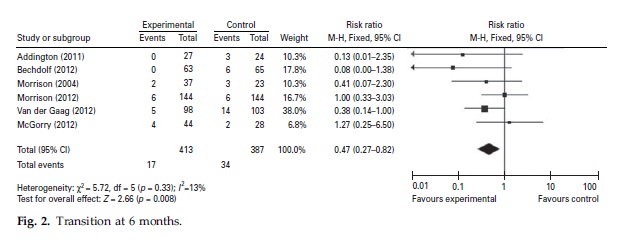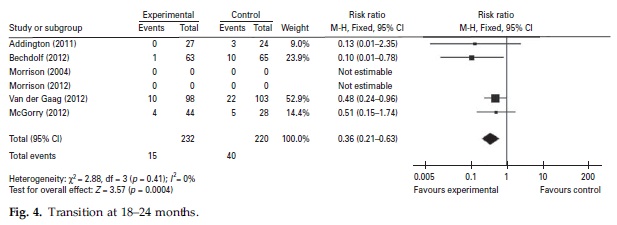Neuroscience




First, what is the design of the McGorry et al study? Well...participants were randomly assigned to the following groups:McGorry et al then have no CBT group (as such) and no randomised control group (as such)... So, its difficult to see how the studies by Bechdolf et al and McGorry et al could be described as assessing the impact of CBT per se and when they are r emoved them from the equation ...the effect is non-existent As mentioned, I have covered the Stafford et al meta analysis and some of the studies and issues in my other post. Nevertheless, I would conclude by reiterating: a) the extremely low transition rates (<10%) of Ultra High Risk individuals b) CBT shows no evidence of preventing transition - indeed, no single study shows a significant and reliable effect; and finally, c) even if CBT did prevent transition to psychosis ...How would it actually be preventing psychosis? The whole approach is bereft of any theoretical ideas on this notion - one thing is sure - it is NOT via the reduction of symptoms - as both meta analyses definitely show that symptoms do not change from before to after CBT
- Meta-matic: Meta-analyses Of Cbt For Psychosis
Meta analyses are not a 'ready-to-eat' dish that necessarily satisfy our desire for 'knowledge' - they require as much inspection as any primary data paper and indeed, afford closer inspection...as we have access to all of the data....
- Who Watches The Watchmen? Bias In Studying Bias
The coins are often very old by the time they reach the jeweller With his hands and ashes he will try the best he can He knows that he can only shine them Cannot repair the scratches The Jeweller (by Pearls Before Swine) Publication...
- Cbt: She's Lost Control(s) Again
And of a voice that told her when and where to act, She said I've lost control againJoy Division (Shes Lost Control Again) Cognitive therapy for people with a schizophrenia spectrum diagnosis not taking antipsychotic medication: an exploratory...
- 'representative' - Its Too "too Too" To Put A Finger On
Prove it... just the facts... the confidentialThis case, this case, this case that I...I've been workin' on so long...Chirpchirp...the birds they're giving you the words The world is just a feeling you undertook. Now the rose, it slowsyou...
- Cbt: You Spin Me Round
Although we failed to show a statistically significant effect of the intervention we cannot rule out a beneficial effect of the cognitive therapy on transition rate (although it could be argued that the sample size required to show such an effect,...
Neuroscience
The Dream Machine - Cut ups, cut ins, cut outs

Our new soap that's peachy keen saves your soul and keeps you clean
It's recommended, used by the Queen
Gonna improve your IQ, help in everything you do
It's economic, don't cost too much.
It's recommended, used by the Queen
Gonna improve your IQ, help in everything you do
It's economic, don't cost too much.
Know Your Product (The Saints)
Hutton P and Taylor PJ. Cognitive behavioural therapy for psychosis prevention: a systematic review and meta-analysis. Psychological Medicine (2013): 1-20
In January I blogged on a meta-analysis by Stafford, Jackson, Mayo-Wilson , Morrison & Kendall published in the BMJ - My post - Its Just a Story: Transition to Psychosis & CBT - concerns whether CBT may prevent transition to psychosis.
Cut ups
Three months on and we have another meta-analysis on the same topic from one author (Hutton) who coincidentally works in the lab of one author (Morrison) on the earlier paper
It's a mash-up (Pistols meet Madonna)
As noted, I have already covered some problems with the original BMJ paper and much of what I said there applies here. Nonetheless, the current meta-analysis makes greater claims for CBT preventing transition to psychosis e.g. over longer periods of time.
At every time point, the relative risk of transition was reduced by more than 50% for those receiving CBT. (Hutton & Taylor 2013)
The Saints (1978, Know your Product)
A fine Australian export
"Where's the Professor...we need him now"
Why do Hutton & Taylor come to somewhat grander conclusions in favour of CBT? One reason is because they included a study not included by Stafford et al. The study is by Bechdolf et al. (2012) "Preventing progression to first-episode psychosis in early initial prodromal states." As Figure 2 (below) from Hutton & Taylor shows, this Bechdolf paper is the most favourable towards CBT preventing transition (with largest risk ratio here at 6 months, but also in their 12 month (0 and 9 transitions for Experimental and controls respectively) and 18-24 month analyses (1 and 10 transitions) - so is worth looking at in more detail

Its not that Stafford et al were unaware of the Bechdolf paper, so why did they not include it...?
Crucially, Bechdolf et al used Integrated Psychological Intervention (IPI), which does include individual CBT, but also group skills training, cognitive remediation and multifamily psychoeducation. So, even if changes in transition rates emerge - they are no more attributable to CBT than any other component of the IPI intervention. Unsurprisingly then, in their meta analysis, Stafford et al examined IPI studies including the Bechdolf study separately from their CBT analyses.
Jim Morrison (& the Doors) duets with Amy Whinehouse
Some mash-ups are made in heaven
Its also worth noting that Bechdolf et al also differs from the all other studies as their participants were prodromal, i.e. had self-reported symptoms which they describe as preceding the subthreshold psychotic symptoms typically used as entry conditions in the other studies. Finally, Stafford et al rated study quality using the GRADE system (for risk of bias, inconsistency, indirectness, imprecision, and publication bias) and classed the Bechdolf et al study as 'very low' quality evidence - indeed, the lowest possible in that framework.

You can't fake quality any more than you can fake a good meal
William Burroughs
A second difference concerns the inclusion of McGorry et al (2012) by Hutton & Taylor. Again its worth examining this study in more detail

First, what is the design of the McGorry et al study? Well...participants were randomly assigned to the following groups:
Cognitive Therapy + Risperidone
Cognitive Therapy + Placebo
or Supportive Therapy + Placebo.
Plus
a 'Monitoring' group - or those people who refused random assignment - so are not -in fact - part of a randomised trial (but self-selecting controls!)
~
When Brion Gysin spoke about his 'Dream Machine', he said it was "The worlds only artwork that you look at with eyes tightly closed" - I wonder if the same might be said of CBT for psychosis.
- Meta-matic: Meta-analyses Of Cbt For Psychosis
Meta analyses are not a 'ready-to-eat' dish that necessarily satisfy our desire for 'knowledge' - they require as much inspection as any primary data paper and indeed, afford closer inspection...as we have access to all of the data....
- Who Watches The Watchmen? Bias In Studying Bias
The coins are often very old by the time they reach the jeweller With his hands and ashes he will try the best he can He knows that he can only shine them Cannot repair the scratches The Jeweller (by Pearls Before Swine) Publication...
- Cbt: She's Lost Control(s) Again
And of a voice that told her when and where to act, She said I've lost control againJoy Division (Shes Lost Control Again) Cognitive therapy for people with a schizophrenia spectrum diagnosis not taking antipsychotic medication: an exploratory...
- 'representative' - Its Too "too Too" To Put A Finger On
Prove it... just the facts... the confidentialThis case, this case, this case that I...I've been workin' on so long...Chirpchirp...the birds they're giving you the words The world is just a feeling you undertook. Now the rose, it slowsyou...
- Cbt: You Spin Me Round
Although we failed to show a statistically significant effect of the intervention we cannot rule out a beneficial effect of the cognitive therapy on transition rate (although it could be argued that the sample size required to show such an effect,...
